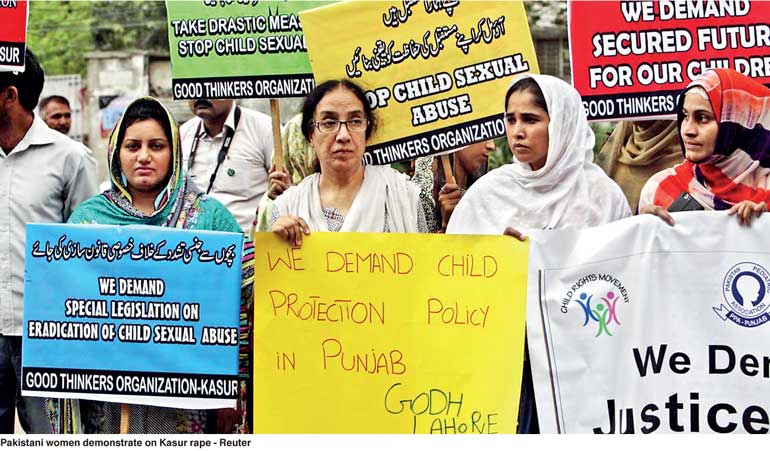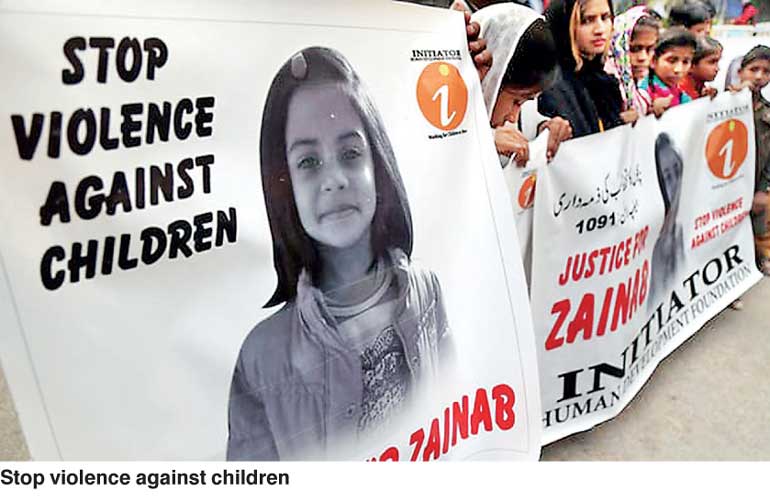Saturday Feb 21, 2026
Saturday Feb 21, 2026
Saturday, 20 January 2018 00:03 - - {{hitsCtrl.values.hits}}


Since the first week of the New Year, Pakistan has been in turmoil over the abduction, rape and murder of an eight-year-old girl, Zainab, in Kasur, a small town not far from Lahore in the Punjab province.
It is a pity that Kasur, sanctified by the burial site of the celebrated 18th Century Punjabi Sufi poet Bulleh Shah who had spoken up for women in an age of male dominance, should now be the “child rape capital” of Pakistan.
Shocked to the core by the rape and murder of angelic Zainab, even conservative and reticent Muslim women were out on the streets all over Pakistan to demonstrate their anger and anguish about the gory deed.
Men went into a collective frenzy, rioting in various places and killing at least two persons. The incident was grist to the mill of the opposition parties to lambast the Shehbaz Sharif Government in Punjab for negligence. Civil society activists took up the issue with zeal demanding that the authorities look deeper into the basic causes of such acts and attack the phenomena at their root.
The Lahore High Court ordered the police to catch the culprits at the earliest. Shaken by the scale and intensity of the uprising, the Federal and Punjab governments promised swift action. And for once, the police shed their indifference to social evils and went on an overdrive, if only to appease the enraged public.
The Additional Inspector General of Police (Investigation) of Punjab, Abu Bakar Khuda Bakhsh, told a Parliamentary committee that 1,500 persons had been investigated in the case. He also revealed that since July 2017, seven cases of sexual assault on kids had been reported in Kasur within a half-a-kilometre radius.
DNA samples in all those cases were similar and the suspicion was that the acts were committed by a serial rapist cum killer. The role of one Tanveer is being investigated, Bakhsh added.
Writing in Express Tribune, Hasaan Khawar points out that Zainab’s murder was the 12th such case of child sexual murder reported from within a two-kilometre radius in the past 12 months.
“Besides geographical proximity, other similarities in these cases include use of under-construction houses, crimes occurring between 4 p.m. and 9 p.m., and rape or sodomy of children, before killing them,” he added.
The media quoted “Sahil” — an independent NGO — as saying that there were 129 cases of child assault in Kasur in 2017, including 34 abductions, 23 rapes, 19 sodomy cases, 17 attempted rapes and 10 abductions with rapes or gang-rapes. During the last three years, on average, there have been two reported cases of child sexual abuse every three days in Kasur.
The all-Pakistan figures are also alarming. About 11 children were sexually abused every day in the country in 2016, while a child was murdered after sexual abuse every three to four days, according to Sahil.
Again according to Sahil, only 78% of those cases were registered with the police. In 142 such cases the police had refused to register a First Information Report (FIR).
 Social activists are sure that non-reported cases would be much more because of police apathy, parental fear of social stigma, and the possible involvement of a close friend or family member in the crime.
Social activists are sure that non-reported cases would be much more because of police apathy, parental fear of social stigma, and the possible involvement of a close friend or family member in the crime.
Hasaan Khawar points out that while the entire country knew about rampant child abuse in Kasur, the website of the Kasur District Police is totally blank as regards child abuse.
According to Pakistani journalist Xari Jalil, Kasur has been seeing social violence since 2014, when two Christian brick kiln labourers, Shama and Shahzad Masih, were accused of blasphemy and burnt alive by a mob.
A gang organising child porn, which was discovered in 2015, was patronised by a local member of the Punjab Assembly belonging the ruling Pakistan Muslim League (Nawaz). The concerned member of provincial assembly was let off the hook, but the ring leader was nabbed and jailed.
According to Mamtaz Gohar, Senior Program Coordinator at Sahil, there has been an increase in rape cum murder cases. In Kasur in 2015 and 2016, four children were found raped and murdered in both years. In 2017 there were 11 such incidents. Gohar believes that for every reported case, there would be many unreported ones.
According to media reports other districts too have not been safe for children. Even as the Zainab case shocked the nation, the body of 15-year-old Sajida – raped and murdered – was found in a field in the outskirts of Sargodha. The same week, a molested body of 11-year-old Shariq was also found in Kasur, in a field. In November 2017, 10-year-old Ali Raza had also been sexually assaulted and murdered in the same location.
Legal experts tend to put the blame for the increasing number of such cases to legal and police negligence which is reflected in the very low conviction rate in Pakistan.
But social activists feel that the problem is located much deeper in the nature of Pakistani or South Asian society, where women, whether old or young, are subjugated and degraded in myriad ways.
As Dr. Shenila Khoja-Moolji says in an opinion piece in Express Tribune: “Rape and murder of girls do not happen in a vacuum. It is an effect of sedimented societal views about the female sex and institutional practices that reproduce male dominance in every domain of life.
“We (the men) live in a society that abhors women. We don’t like it when they enter the workplace and make it known through harassment and unequal pay. We ogle them when they are on the streets and even grope them when the opportunity presents itself.
“We are threatened when they appear as TV personalities and curse at them on air. We create a political fuss when a girl with uncovered hair is depicted in a textbook. We pass laws like the Hudood Ordinance (Islamic ordinances reinforcing conservative social mores). We police what women can wear at universities. We even reprimand female professors for wearing jeans!”
“We do all this, and then wonder why eight-year-old girls get assaulted? Who is responsible for this monstrosity? YOU. You, my dear reader, and I, are complicit in reproducing a system that views women as sub-human. We reinforce male privilege through minor, everyday actions from swear words to advocating for policies that make life unbearable for women.
“If we are so angry about what happened to Zainab, then it behoves us to first check ourselves and our views about women and girls. We then have to come out and try to hold societal institutions — from the state and the media to the mosque — accountable for portraying women as less-than-men.
“Indeed, in Pakistan, women are not considered as fully human. They are viewed as sex objects available for men’s pleasure, as upholders of familial morality and honour, or as domestic managers who will nurture children. Women who deviate from these pre-assigned roles do not have much breathing room.
“If men are so mad at Zainab’s murder then let’s see them give up their privilege and make space for women in their professions, on the streets, in media and in politics. Let’s see them pass pro-women laws or just implement the laws already in place. Let’s see them stand up and speak for women when misogynist elements want to push women to the margins every day.”
